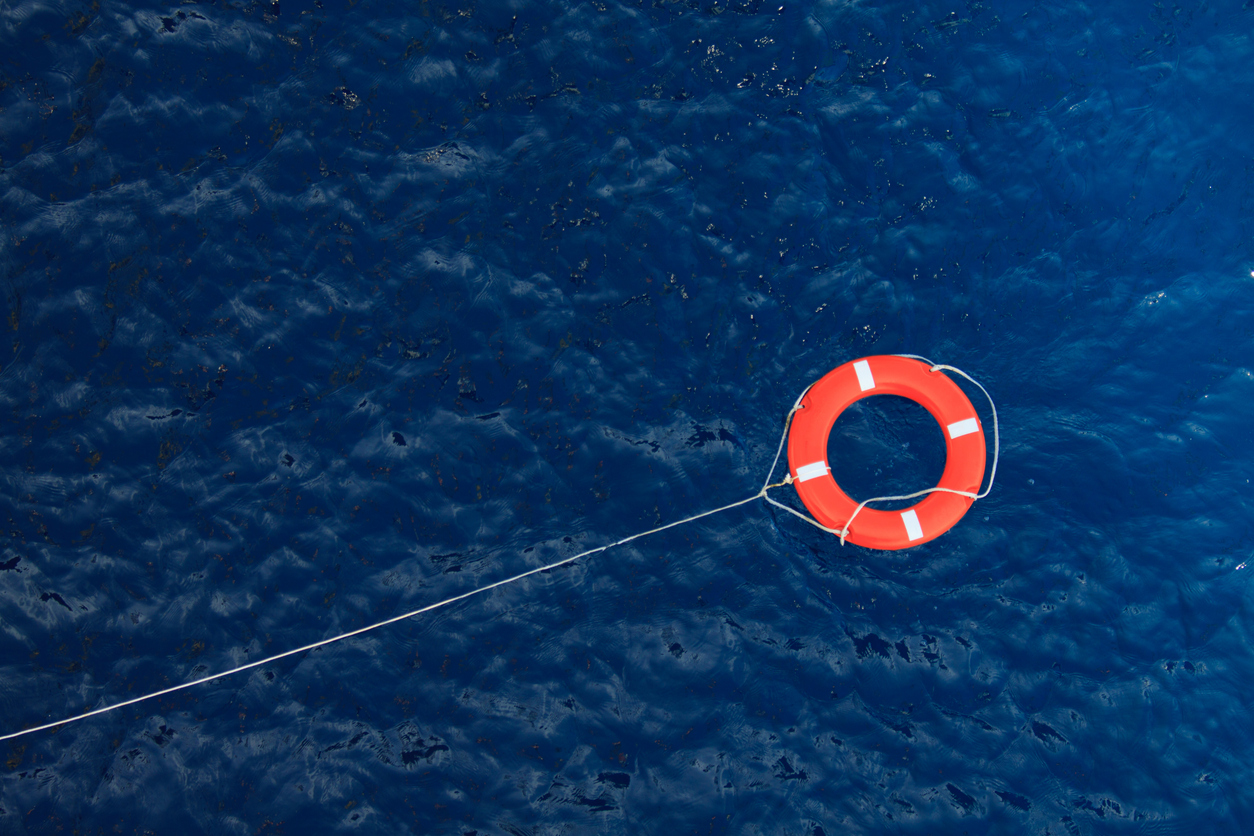Man overboard: Prevention and recovery
23 September 2025

When it comes to boat safety, it’s incredibly important that everyone on a vessel knows what to do when they hear the phrase ‘man overboard’, and when they should call it themselves.
In this guide, we’ll look at what ‘man overboard’ means, when it’s used, and what happens if someone falls overboard. Plus, we’ll share some important ‘man overboard’ manoeuvres and some tips for preventing people from falling overboard.
What does the phrase ‘man overboard’ mean?
The phrase ‘man overboard’ is a nautical emergency call used when someone has fallen off a boat or ship into the water and needs to be rescued immediately.
‘Man overboard’ is called when any person has gone over the side of a sailing boat, ferry, yacht, naval ship, or other type of vessel, regardless of their gender. It’s important to notify people quickly when someone has fallen overboard as they could drift away from the vessel and suffer from shock, hypothermia, or injury. They may also be difficult to spot due to bad visibility, especially at night or in rough waters.
When is ‘man overboard’ used?
‘Man overboard’ is used as soon as someone falls into the water from any type of vessel and can be called by anyone who witnesses the fall. This alerts the crew and others on board that someone has gone over the side of the boat or ship.
The call can also be used during safety drills or training to simulate emergency procedures and ensure the crew knows what to do should they hear the phrase while at sea.
It can be called in a range of situations that result in someone falling overboard, including:
- a crew member slips and falls off a boat while sailing
- a passenger loses balance and falls from a ferry
- a person is knocked overboard during rough seas or by swinging equipment
What happens if someone falls overboard?
If someone falls overboard, you should follow these steps:
- Shout “man overboard” loudly and repeatedly
- Immediately throw a life ring or flotation device
- Assign someone to point continuously at the person in the water to keep them in sight
- Stop or turn the vessel to begin recovery
- Sound the alarm and press the man overboard button on the plotter
- Radio a distress call to the coastguard if needed
What are ‘man overboard’ manoeuvres?
There are three main ‘man overboard’ manoeuvres. These are:
The Williamson Turn
The Williamson Turn is best for when someone has fallen from a ship or motorboat, especially when visibility is poor.
- Turn the wheel hard over in the direction of the person overboard
- After you’ve completed around a 60° turn, swing the wheel back hard in the opposite direction
- Continue turning until the vessel is on a reciprocal course
- Slow down and approach the person carefully for recovery
The Anderson Turn or Single Turn
This ‘man overboard’ manoeuvre should be used when someone falls off a powerboat or when the person overboard is still in sight.
- Immediately turn the wheel hard toward the person overboard
- Make a continuous 270° turn back toward them
- Approach with the person on the leeward side or windward side depending on boat type
The Scharnow Turn
The Scharnow Turn is ideal for larger vessels that have already travelled well past the person overboard before the emergency is noticed.
- When the decision is made to turn, put the rudder hard over in the desired direction
- After the vessel has turned about 240°, shift the rudder hard in the opposite direction
- Continue the turn until the vessel has swung a full 180° and is on a reciprocal course
- Steady the ship and prepare for recovery of the person in the water
How to prevent people from falling overboard
Preventing people from falling overboard is a top priority for boat safety, whether you're on a small sailboat or a commercial vessel. While there’s always the possibility of an accident occurring, there are many simple, effective ways to reduce the risk.
1. Install safety features
To help prevent people from falling overboard, safety features should be installed and everyone on board should be aware of why these features are in place and how to stay safe while on the boat or ship.
Physical barriers, such as guardrails and handrails should be implemented around open decks and non-slip surfaces added to decks, stairs, and ladders. Lifejackets must be provided for everyone on board and tethers or harnesses should be used on sailboats during rough weather. You can even get AIS MOB devices that can alert those around you should you fall overboard, as well as surrounding AIS or VHF radio devices on other boats.
2. Ensure good visibility on board
When it’s dark or the weather conditions are unfavourable, visibility can be poor which may make it more likely that someone will get too close to the edge and fall overboard. It’s important to install efficient deck lighting and even glow-in-the-dark tape for night-time safety. Clearly mark trip hazards or steps so people know when to tread especially carefully if moving around the vessel.
3. Encourage safe behaviour
All passengers and crew must be briefed on safety rules before departure. This includes showing them where lifejackets and other emergency items can be found. Explain how important it is to always hold on and limit walking on deck when the boat is moving quickly or visibility is poor. People should be encouraged to stay seated where possible.
4. Regular maintenance and checks
Safety equipment must be maintained carefully and checked regularly to ensure it’s all in good working order. For example, railings, and harness points should be inspected for wear or corrosion and anti-slip paint or tape tested and replaced as needed.
In addition to this, ropes, tools, and other items must be stored securely to avoid trip hazards, and anything loose should be securely tied down.
Specialist boat insurance through GJW Direct
Now you know about staying safe when it comes to a man overboard situation, you may also consider specialist boat insurance to help financially protect you while out on the water. Get a quick online quote today.
Please note the information provided on this page should not be taken as advice and has been written as a matter of opinion. For more on insurance cover and policy wording, see our homepage.
Got a question? Call our UK call centre 0151 473 8000
©Copyright Ripe Thinking Limited 2026. GJWDirect® is a registered trademark and a trading name of Ripe Insurance Services Limited which is Authorised and Regulated by the Financial Conduct Authority No.313411.
Registered office: One Stockport Exchange, Railway Road, Stockport, United Kingdom, SK1 3SW. Registered in England No. 04507332.
